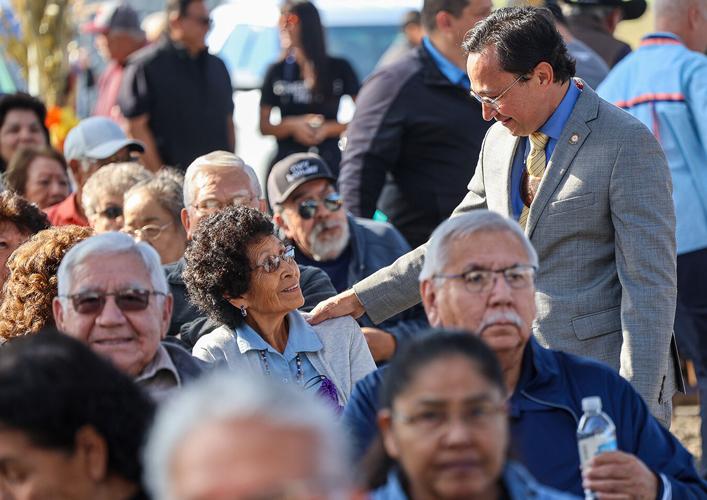
- Details
- By Chuck Hoskin Jr
Guest Opinion.Language connects us to our ancestors, our identity and our place in the world. For Cherokee Nation, preserving and revitalizing our unique language is a sacred duty. With every word of Cherokee spoken or written, we reclaim another piece of what it means to be Cherokee.
The task of revitalizing our language remains great, but through long advocacy to the federal government, we’ve achieved a major advance. At the recent White House Tribal Nations Summit, the Biden-Harris Administration unveiled a 10-year National Plan on Native Language Revitalization. The sweeping strategy — developed with input from tribal nations and the departments of the Interior, Education, and Health and Human Services — acknowledges and addresses the United States government’s historical role in the loss of Indigenous languages.
 Make A Donation Here
Make A Donation Here
Cherokee Nation is ready to leverage the new momentum. Just last week, we signed an agreement that establishes a formal partnership between the tribe, Cherokee Film and federal entities, including the Department of the Interior, the Bureau of Indian Affairs and the National Fund for Excellence in American Indian Education.

Over the next decade, this collaboration will work to advance language revitalization efforts through film and media. Cherokee Film will provide expertise and access to its extensive nationwide network to assist tribes in preserving and promoting their languages.
This collaboration will not only preserve our language but also promote it on popular educational and entertainment platforms. Future generations will be able to hear and see Cherokee spoken and celebrated in everyday life.
The new federal, 10-year vision builds upon the findings of the Federal Indian Boarding School Initiative, which exposed the devastating impact of the federal government’s suppressing Native languages in youth and irrevocably damaging Native families and communities. Doing justice to this immense tragedy requires a major response, like the plan’s call for funding 100 new K-12 Native language immersion schools and training 10,000 Native language teachers.
For Cherokee Nation, these national efforts are long overdue, and they align with our own commitment to language preservation. Under our own Durbin Feeling Language Preservation Act we are making a historic effort to revitalize the Cherokee language, committing around $20 million per year. New federal dollars for language immersion and community revitalization will amount to about $1.5 billion annually nationwide over the next decade, and mirror our plans to grow our own schools, including a new middle school for Cherokee language learners.
While we commend the current administration for its leadership on Indigenous language efforts, Cherokee Nation’s work transcends political parties or cycles. Our vision for language revitalization requires collaboration through changing administrations in the White House and the ever-shifting balance of Congress. That is why my administration and the Council of the Cherokee Nation operate on a bipartisan basis, advocating for our interests without fear or favor, regardless of who occupies the highest offices in Washington.
As stewards of Cherokee culture, we can see a future where our language thrives in classrooms and homes and across TV screens and cellphones. Wherever people want to learn and hear Cherokee spoken, we want to be there. Yes, the federal government’s 10-year plan provides needed resources, but it is our responsibility to use them wisely. Language revitalization is about empowering each new Cherokee learner to carry our culture and tribe forward.
Chuck Hoskin, Jr. is the principal chief of the Cherokee Nation.
More Stories Like This
The Lie We Keep Telling About Wounded KneeAnother Weapon of Mass Destruction
Colorado cannot heal until it confronts Sand Creek honestly
Native American Mothers Deserve to Live
Technology Rooted in Tradition is Strengthening Cherokee Nation
Help us defend tribal sovereignty.
At Native News Online, our mission is rooted in telling the stories that strengthen sovereignty and uplift Indigenous voices — not just at year’s end, but every single day.
Because of your generosity last year, we were able to keep our reporters on the ground in tribal communities, at national gatherings and in the halls of Congress — covering the issues that matter most to Indian Country: sovereignty, culture, education, health and economic opportunity.
That support sustained us through a tough year in 2025. Now, as we look to the year ahead, we need your help right now to ensure warrior journalism remains strong — reporting that defends tribal sovereignty, amplifies Native truth, and holds power accountable.
 The stakes couldn't be higher. Your support keeps Native voices heard, Native stories told and Native sovereignty defended.
The stakes couldn't be higher. Your support keeps Native voices heard, Native stories told and Native sovereignty defended.
Stand with Warrior Journalism today.
Levi Rickert (Potawatomi), Editor & Publisher
